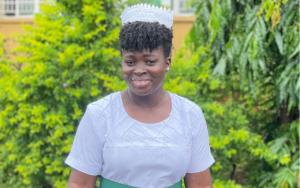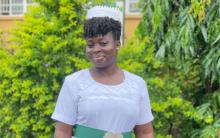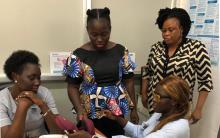Enhancing access to and use of Family Planning services and products using Self-care guidelines for Sexual Reproductive Health Rights (SRHR)
In 2023, Maima Amy Pabai, a Nursing Officer and midwife working at the Sexual and Reproductive health unit in King Harman Maternal and Child Health Hospital, was trained by WHO on the use of the self-care guidelines for SRHR and tasked to support women and girls visiting the health facility and those in the surrounding areas on the administration of the self-injectable family planning. Since this training, Maima has worked tirelessly to encourage women and girls in the western area urban district of Sierra Leone to take Sayana Press, a self-injectable family planning method, a task she says is daunting due to cultural and religious beliefs and the myths and misconceptions surrounding family planning.
“We are seeing a gradual uptake and increase of Sayana Press since its rollout, but many women are still terrified of self-administration. We, therefore, help them to administer the injectables, and for those living in distant areas, they take them to health workers close by to assist in administering the injections,” said Amy. “But even with all the challenges of fear, religious and cultural beliefs, and the myths and misconceptions surrounding family planning, nothing has stopped us”, she added.
“We continue to engage with communities and conduct mass sensitizations of the new family planning product through radios and TV shows, outreaches, and hospital antenatal, postnatal, vaccination points, and child health clinics on the benefits of the self-administered injectables, we also use community health workers to sensitize communities.,” added Amy.
In Sierra Leone, Family planning use remains low, at 24 percent among women of reproductive age. To encourage its uptake and create demand among women and girls in Sierra Leone, WHO, in collaboration with the Ministry of Health, developed, adopted, and rolled out self-care guidelines for Sexual Reproductive Health and Rights (SRHR). The guidelines were intended to allow clients to provide self-care with/without the help of healthcare workers and empower women and young girls to access SRHR services independently while removing the various barriers/bottlenecks that women and young girls endure to access some of the essential services. As part of this intervention, WHO piloted self-injectable family planning (Sayana Press) in the western area district with a plan to scale -up all over the country.
Amy benefited from the WHO training, since then she has conducted on-the-job training and mentorship for her colleagues, including nurses and midwives, and the result was an encouraging number of women taking the self-injectables from 0 in Jan 2023 to 115 cumulatively by the end of 2023. To ensure follow-up of the cases, Amy said that all women and girls who take Sayana Press are registered in a book and followed.
She has learnt that, although so many family planning commodities are being directly procured from pharmacies no education on the side effects is provided to women and girls, who later visit the facility for guidance when they experience side effects, hence creating fear among the users and those close to them.
Amy said that there is no one way to encourage Sierra Leonean women to take up family planning except to engage with them while contentiously emphasizing its benefits. “Family Planning is not a sin or forbidden by God; instead, it helps women to have the number of children that they can care for, and as a woman, family planning enables us to achieve our goals and staying fit health wise rather than producing one child after another which puts a woman’s health at risk. These are my daily messages to my clients.” Concluded Amy.
The Self-care guidelines for Sexual Reproductive Health Rights (SRHR) adaptation and roll out was made possible through the support of the Swedish International Development Cooperation Agency (SIDA).





